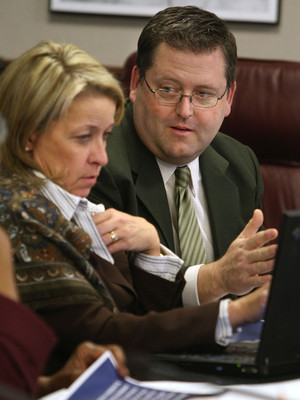Ethics panel’s power over legislators argued
CARSON CITY -- All seven Supreme Court justices questioned Monday whether the state Ethics Commission is legally entitled to discipline legislators.
Justices said that under the state constitution, the power to punish legislators is given exclusively to the Legislature.
During a 70-minute hearing, they wondered aloud whether the Legislature could have constitutionally delegated that power to the executive branch of government in 1985 when they passed a law creating the Ethics Commission.
Before 1985, the Legislature had its own ethics panel, and another handled executive branch matters. Now, all nonjudicial public officials, including legislators, can be disciplined by the Ethics Commission, an agency of the executive branch.
"Can the Legislature, under the separation-of-powers doctrine, even enact this law?" asked Chief Justice Jim Hardesty during the hearing.
The justices were hearing an appeal of a decision by District Judge William Maddox, who had ruled that the Ethics Commission cannot decide a complaint against Sen. Warren Hardy, R-Las Vegas.
Last year, Henderson resident Richard B. Miller filed an ethics complaint alleging the senator repeatedly broke laws by voting on matters the helped his employer, the Associated Builders and Contractors. Hardy is the organization's president.
The Ethics Commission dropped 11 of the 12 charges against Hardy but found sufficient cause to conduct a full hearing on whether he broke laws by voting in 2007 on Senate Bill 509. The bill would have required contractors to pay more money to workers on some projects.
After the bill was defeated, Hardy sent a letter to his group's Las Vegas members "trumpeting" the bill's defeat.
When the Ethics Commission tried to conduct a hearing in December, the Legislature filed a lawsuit in District Court that challenged the commission's authority to punish legislators on voting matters.
During Monday's hearing, Ethics Commission lawyer Adriana Fralick said the commission has issued 19 opinions affecting legislators in the past 24 years. She said that lawmakers in 1985 gave the new commission power to punish legislators despite mentioning possible constitutional problems during hearings.
"For 24 years, the Legislature has subjected itself to the Ethic Commission and ethics law, and now it says Sen. Hardy has immunity," she said.
But Justice Michael Douglas contended the Legislature could not give the authority to punish its members to an executive branch agency.
"The Legislature is not the source of the power, the constitution is the source of the power," Douglas said.
If the Supreme Court takes away the power to discipline legislators from the Ethic Commission, justices will have to declare the 1985 law unconstitutional, Deputy Legislative Counsel Kevin Powers said.
Powers added that staff lawyers in 1985 warned legislators that the act could be unconstitutional.
"The Legislature does not always take the advice of its lawyers," he said.
Contact Capital Bureau Chief Ed Vogel at evogel@reviewjournal.com or 775-687-3901.




























